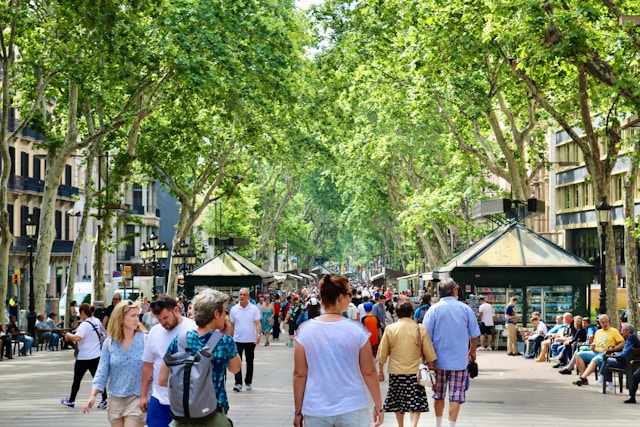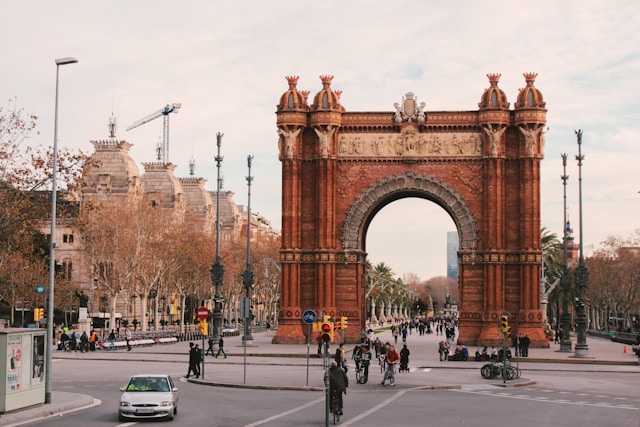
Spain is currently becoming increasingly popular among digital nomads, especially in cities like Barcelona, Madrid, and Valencia. These cities are gradually developing active digital nomad communities, allowing more digital nomads to connect with other remote workers, participate in events, share experiences, and build social networks.
Spain offers a pleasant climate with abundant sunshine, attracting digital nomads to enjoy vacations and long-term work while indulging in outdoor activities and rich natural environments. It enhances their quality of life by providing opportunities for leisure and relaxation.
Another advantage is that, compared to some other European countries, the cost of living in Spain is relatively low. Expenses such as rent, food, and transportation are reasonably affordable, enabling digital nomads to enjoy a high-quality lifestyle at a lower cost. They can also experience unique Spanish culture and indulge in traditional Spanish cuisine, such as paella and tapas. Additionally, each region has its own distinct style and traditions, allowing digital nomads to enrich their cultural experiences by exploring different cities and areas.
So, is it really that easy to be a digital nomad in Spain in practice? This article will explore the pros and cons of the digital nomad lifestyle in Spain in various aspects.
Recommended Places to Live
Spain is highly diverse in terms of culture, climate, and regional characteristics. The most popular cities for digital nomads in Spain are Madrid, Barcelona, and others. However, what challenges do we face when choosing to settle in such cities?
Taxes
When choosing a place to live, considering the tax implications is crucial. Because depending on your income, your tax obligations in Spain can be quite high, and the place of residence also determines how much tax you will pay.
In Spain, income tax consists of two parts. The first is the national tax from the central government of Spain, and the second part is the regional tax. Currently, the tax from the central government is the same for everyone, but the regional tax varies depending on where you reside.
Beckham Law
According to the information gathered in this article, there is a scheme available for high-income earners that allows you to pay lower taxes during the first five years of relocating to Spain, known as the “Beckham Law.” Under the Beckham Law, foreigners can pay a flat tax rate of 24% on income up to €600,000 per year within the first five years. This applies to foreign nationals who are new residents of the country, such as directors, managers, highly skilled workers, or remote workers. Unfortunately, self-employed individuals do not qualify for this scheme. However, it is possible to consult with tax lawyers through comments on this article to determine if you meet similar criteria for the Beckham Law.
Let’s take a look at the explanation provided by the YouTuber “Millennials With Money” in their video “MOVING TO SPAIN IN 2024 Where to live, residency, taxes cost of living”:
“For example, someone living in Madrid who earns €30,000 a year, let’s give an example, will pay less tax than someone living in Valencia or Barcelona, who makes the same amount of money because of the way the autonomous community taxes are structured in the Madrid community, in the Valencian community, and in Catalonia. So definitely important to get a proper tax assessment and look into the tax implications of moving to Spain as well. Also, consider if Spain has a double tax treaty with your country. That will be important to keep in mind as well.”
“The two other taxes that you need to keep in mind are VAT sales tax, which is 20-21% on the majority of products sold, you know, in supermarkets, electronic stores, whatever. And they’re already incorporated into the price that you see on the item when you buy it as well. And if you’re buying a secondhand car or a property, for example, then you’ve also got a tax known as ET or ITP in English, which is a tax you pay on the transmission of secondhand goods. And the ITP rate again is something that will vary depending on the region of Spain.
You’re in for example in Madrid, it is 6%.
And it can be lower if it’s a property.
In certain cases, whereas in Catalonia and Valencia, it’s around the 10-11% mark, if I’m not mistaken. So keep these in mind when you come into Spain as well.”
Energy Issues
Electricity
Electricity and energy issues have been hot topics in Europe in recent years. So, what is the situation in Europe?
We’ve learned that in Spain, there are essentially two types of electricity contracts. You can choose between the liberalized market or the regulated market.
- Liberalized Market: In the liberalized market, your energy bill depends on the contract price set by your electricity supplier, which remains unchanged throughout the contract period unless they notify you of any new price adjustments.
- Regulated Market: In the regulated market, electricity prices may fluctuate due to changes in the European electricity market. In 2021, regulated market electricity prices experienced significant increases, although they are generally relatively cheaper.
Let’s take a look at the explanation provided by the YouTuber “Millennials With Money” in their video “MOVING TO SPAIN IN 2024 Where to live, residency, taxes cost of living“:
“So the government introduced some measures to try and control the price of electricity, such as lowering VAT, and they also managed to make a deal with the European Union, along with Portugal, for the Iberian exception, which essentially further prevented the price of electricity going out of control.
And so, your electricity bill will very much depend on how much electricity you consume, how many people are living with you, etc. But data from the OCU, which is the customer protection organization in Spain, shows that the average electricity bill per month in Spain for the month of November was about €55 per month.
Now, keep in mind a lot of these temporary measures that were introduced, such as lower VAT and the Iberian exception, will all come to an end at the end of this year. So electricity prices will probably see quite an increase going into next year.
As well, and keep in mind the seasonality. As well, if you’re coming from a northern European country in Spain, you may have to heat your home a little bit in the winter. But in the summer, you’ll almost certainly use a lot of electricity with air conditioning. So the summer months can be pretty expensive when it comes to air conditioning.”
Oil
If you plan to drive in Spain, it is essential to be aware of fuel prices. Similar to electricity, fuel prices also experienced significant increases in 2022. Therefore, the government has taken measures to lower consumer fuel costs, such as another reduction in value-added tax.
Of course, you can also consider electric vehicles. Regarding electric vehicles, there are different advantages and disadvantages in different regions.
Let’s take a look at the explanation provided by the YouTuber “Millennials With Money” in their video “MOVING TO SPAIN IN 2024 Where to live, residency, taxes cost of living“:
“If you’re looking into an electric vehicle or using an electric vehicle while you’re in Spain, there is infrastructure being rolled out, particularly in the big cities like Madrid. There are charging points and parking spaces dedicated for electric vehicles. But across the rest of the country and particularly on bigger infrastructure like motorways, I think there’s still quite a way to go before we get to a stage where electric mobility can be a viable option for the majority of the population in Spain.”
Cost of Living
Let’s assume you go to a supermarket in Spain, and if you come from North America or Northern Europe, you’ll find that prices are generally much lower compared to your home country. But how exactly does it compare?
Let’s take a look at the explanation provided by the YouTuber “Millennials With Money” in their video “MOVING TO SPAIN IN 2024 Where to live, residency, taxes cost of living“:
“The price of olive oil has increased significantly because of drought in the south of Spain. So, as much as supermarket food is cheap, there have been quite some increases over the past few years compared to what it was in 2019, for example. Eating out at restaurants can be quite affordable as well. It’s very common for people to eat out throughout the week and on weekends. Particularly, if you go to a local restaurant or a tapas bar, you’ll find very affordable prices, especially if you’re outside of a tourist spot. For the locals, in non-tourist areas, you’ll probably find much better prices, great value for your money, and probably better quality food as well.
There’s a big culture of tapas and sharing food in Spain. If you buy a paella, you’ll see that it’s often meant for a minimum of two people. You can share different cuts of meat between people when eating as well. If you go to a tapas bar and order a drink, they’ll bring you some free tapas along with it. Sometimes it could be a bag of crisps or olives, for example. So, if you’re a foodie and looking for a good culinary experience, then Spain is definitely a good place to come to.”
Now, let’s take a look at the explanation provided by YouTuber Christina Davis in her video “Biggest Pros AND Cons of Living In Barcelona As A Digital Nomad”:
“And one of the best parts, and my next pro of Barcelona, and why I think some people can be social and go out to these little cafe bars and sit and have a beer and Cava or wine with their friends, is because a beer here ranges between like two euros and maybe four euros, depending on what type of beer you’re gonna get. And like a glass of wine is pretty much between three to five euros at most of the places, and Cava could even be two to four or five euros. You can actually enjoy it, and it’s good. It’s not like the cheap wine back in America when I go to the bar and I’m like, “Okay, I’ll have a house wine,” and it’ll be all right, but it’s not gonna be great-tasting. Whereas here, I can literally get a three-euro glass of wine at a restaurant, and it’s delicious.
I even go to my local supermarket, and I can get a bottle of wine, a whole bottle, for two euros, three euros, four euros, five euros, and they taste better than the bottles I buy at home that are like 12 to 15. So your activities to be social or things to go out, even your Tapas, a plate of Tapas, can be four euros, three euros, maybe six euros for a bigger one. It’s just more affordable to be social and to go out and to live that lifestyle where you’re actually enjoying life all the time.”
Transportation Options
Let’s take a look at the description provided by YouTuber Christina Davis in her video “Biggest Pros AND Cons of Living In Barcelona As A Digital Nomad”:
“And if you’re just coming to Barcelona, even to move here or just travel, one of the best things about Barcelona is its easy access to transport within the city. So using the Metro here in Barcelona is so simple. You can download the app Citymapper or you can even use your Google Maps app, and it’ll show you exactly what lines to take. They’re color-coded, so it makes it really easy to find them. They have the metro stops all around the city, so you really can access almost anywhere in the city relatively easily. And the signs are super easy to follow, like I said, it’s color-coded. They make it super simple to use, so you can get around the city super easily. And their transportation system, not even just the Metro, but the bus is really good as well.”
The Issue of Accommodation
Accommodation has always been the most important problem to solve before traveling. So, what kind of challenges do digital nomads face regarding accommodation in Spain?
Let’s take a look at YouTuber Christina Davis’ description in her video “Biggest Pros AND Cons of Living In Barcelona As A Digital Nomad”:
“Now, obviously, I have to give some cons, and one of the cons of living in Barcelona is the old buildings. Now, what do I mean by that? The apartment buildings, for the most part, are pretty old. You do have some that are recently renovated. We’re lucky that ours is one of them. But even saying that, there are two main problems with the old apartments.
Number one, the fact that a lot of them don’t have AC. And I will tell you, in the Spanish summertime, you pretty much will sweat your butt off without AC. I couldn’t live without it. Maybe it’s just my American self being used to air conditioning, but I truly think that AC is something you definitely need. But a lot of the rooms, a lot of older buildings don’t have the capacity to have the AC in there. So, you will have that lack of AC. And then when it comes to wintertime, the weather here is pretty mild in the winter, but because it is a hotter country, the buildings aren’t made to maintain and withhold the heat inside of it. So, in the winter, when I tell you it is cold, it is cold. There were times where it was colder inside my own apartment than it was outside the apartment because it just wasn’t holding the heat. So, you are 100% bundled up in the wintertime inside your apartment.
Unless you have the heat blasting, most times I honestly was in like socks, slippers, sweatshirts, sweatpants, and a blanket on me while I was at home, working or hanging out, just because their heat just really doesn’t hold well within the building. And the other part of that, number two, with the buildings being old, is that the walls are paper-thin. Like, they are so thin. There are times when my neighbors are plugging in something into a socket, and I can hear them, hear them plugging into a socket because that’s how thin the walls are. If they’re playing music and I can hear it through there, they can actually probably hear me right now talking and listening to this video as I’m recording it. So, the walls are super thin. So, if your neighbors have parties, they have people over, you have people over, anything’s going on, you’re most likely going to hear it. And it definitely depends on how the apartment is set up, what walls you are sharing with your neighbor, what rooms are those on either side. But the walls are thin. I can even hear my neighbor above me every once in a while doing their vacuum. I think it is like every Friday for an hour. I hear it for the entire hour, and I know it’s scheduled or on because that is just the life. Obviously, it’s city life, so you are more compacted. That might happen in other cities as well, but definitely something to be mindful of when you’re coming to Barcelona, that a lot of the buildings will be older.“
Apart from issues such as outdated facilities and aging apartments, there’s another significant problem when it comes to renting for international individuals. We can see the drawbacks digital nomads face from YouTuber Christina Davis’ description in her video “Biggest Pros AND Cons of Living In Barcelona As A Digital Nomad”:
“My next thing, keeping on the apartment side of things, is another con, and this con is the fact that searching for an apartment in Barcelona is very difficult. It is not easy because of the fact that there are loads of people, local Spanish as well as international. Like I said, this is definitely becoming a bigger and bigger international hub. The demand for apartments is going up, but the supply of apartments isn’t changing. So, there definitely is a lot of competition for apartments. Being international does make it a bit more of a headache to rent an apartment. We did have some people who just literally would not rent to us because we weren’t Spanish or we did not have a European contract, even though we had money in the bank and could prove everything. They didn’t care. There were other people who were Spanish speakers who obviously they chose over us or people who had work contracts in Europe.
They chose over us, so it is definitely more difficult when you’re a digital nomad or when you’re an international expat trying to find a place to live. It took us about a month to find a place to live, and we saw so many listings in that time span and even found an apartment, put down a deposit, had everything accepted, and then last minute got denied due to insurance reasons because we were foreign. So, it is definitely something to consider. But the Barcelona apartment market is a bit crazy. Rooms or full apartments, both of them are just insane right now, and it’s probably only gonna honestly get worse. So, that is definitely a con for Barcelona, that the apartment search is not easy by any means.”
Advantages of Living in Spain
So, what are the advantages of choosing to live in Spain? Let’s take a look at what digital nomads living in Spain have to say.
Attitude towards life
When it comes to living in Spain, the first thing that stands out is the lifestyle and social attitude. Let’s see what YouTuber Christina Davis describes in her video “Biggest Pros AND Cons of Living In Barcelona As A Digital Nomad”:
“Now, back to the pros, because there are plenty of pros for living in Barcelona. One of the things I absolutely love about Barcelona is the fact that there are so many things to do in this city. Because you have the beach, the mountains, the city life, there is something for everyone. You literally can go down to the beach in the city or even take a train 25 to 30 minutes outside the city and have beautiful beaches on the coast. And then, even if you head up to the top of the city, you go to the mountains. And then, even 45 minutes out of the city, an hour, you have these beautiful mountains like Montserrat, where you can go and you can hike, you can be in more of that mountain landscape, and have the hiking and have the nature outdoors for you. So, there’s something for literally every type of person. And then, obviously, the city itself, there is so much to do in this city. Besides the fact that there are obviously loads of bars and restaurants and meetups and different things you can attend, there are also loads of free festivals and concerts throughout the city at all times.
Especially in the summertime, there is so much going on on the different streets. There are flea markets, there’s Street Markets, there’s street festivals. There are musical shows, there are concerts. There are outdoor cinemas. The list is endless for the things you can actually do in Barcelona, and a lot of them even are free. And like I said before, there are so many meetups and different things that you can do. There are loads of events going on in Barcelona. There are networking events, there are cinema paddleboard events, there’s sunrise yoga, there is morning meditation. There are bar crawls. The list goes on and on. No matter what type of person you are, I swear you can find something for yourself in Barcelona because there is so much going on all the time. And for someone who’s social like me, that is definitely a major, major plus.
And then my next pro, which this might be one of my favorite things and something I learned once I moved to Spain and was much more aware of everyone around me, the Spanish lifestyle is just the best. They’re not in a rush to work their life away. In America, we kind of grew up with this whole live-to-work lifestyle. You literally live to go to work all the time. You work endless hours, and any of the weekends, sometimes for some fun, but honestly, most people just live to work.
They work their lives away, whereas in Spain, they are the complete opposite. Not only do they have a much more relaxed lifestyle, and they believe in living life and enjoying life more. You will always see Spanish people out about. The parks are full of people; the benches are full. They even took this one street in Barcelona and made an entire walk-in street. And on the walking street, there are benches like picnic benches where you can go sit down. I even saw this two older couples, probably above their 60s. They literally brought, like, a picnic blanket. They brought candlesticks, put them on the table, wine glasses, and had some tapas. And the four of them sat down and had a little picnic on the walking street together. Like, how cute is that? And you see people doing that all the time. There are kids out all the parks. There are families out, friends, like little local neighborhood bars are always full of Spanish people sitting outside. Even in November when it’s a little bit chillier, they’ll be out there sitting, having a beer, having a coffee, having a Cava with their friends, just being social and enjoying time together, whether it’s family, whether it’s friends, whether it’s coworkers.”
Next, let’s see what YouTuber Sensational Spain describes in his video “How has Spain Changed you as a Person”:
“ I think the concept of going out and grabbing a drink is definitely more affordable. Just so much more affordable here. I don’t know, like something like El Rastro is something that doesn’t happen in the US so much. So, I guess enjoying outdoors, but not really in a parkway, but just being outside, outside of your apartment, outside of your job or whatever. Um, you definitely have more free time. Lunches take longer. Dinners, you have more social interaction. Like at night, people just have more of a social life, I could say. Yeah, I’d say going to get drinks with your friends or going to Retiro to hang out in the park. It’s less like sitting around hanging out, but going to actually do something to hang out with your friends.
I feel like in America, it’s more structured. For me, my routine was go to school, go to work, spend time with family and friends, of course, but I did a lot of studying. I was home all the time.
And, like, when you live in America, there’s nothing really to do based on where you’re living, but because of that, I was kind of like in one place and kind of depressed. But, okay, no, you’re good. Um, I feel like here, like the lifestyle is a little bit different. Like, the day ends so much later here than it does in the US. I think that in the US, like, you know, you’re trying to, like, start getting ready for bed at, like, 10:00, but here, that’s when you’re starting to go and have your, like, your night, you know what I mean? And, like, people are just, like, so much more, like, open. And I think, like, the people who we’re surrounding ourselves with are also studying abroad, so it’s like the lifestyle, it’s the people. And I think it’s just, like, the atmosphere. It’s much more relaxed. Like, time is not as important. “
Ideal Weather
Another important factor in choosing Spain is its excellent geographical advantage. With distinct seasons and a mild climate, it is a country that is highly suitable for living, especially when compared to countries with extreme climates. Let’s take a look at how YouTuber Christina Davis describes it in her video “Biggest Pros AND Cons of Living In Barcelona As A Digital Nomad”:
“ And my last pro, which I really do love, this pro definitely is a major highlight for Spain for me in general, is the fact that Spain is sunny most of the year. Their winter is very mild. I think I had like a shearling jacket for winter, and that was really it. I didn’t need a massive amount of layers. Obviously, you can use a puffer jacket, but it’s not like you’re in the freezing, freezing cold like other countries in Europe. It is actually relatively mild for their winter. It does get cold sometimes, but it doesn’t last for very long. And because there are over 320 sunny days a year, even in the winter time, when the sun is out, it’s shining directly on blue skies. In the middle of January or February, and you’re outside, it actually feels amazing. The amount of times I would go to the park in March and just lay down, and I could be in a tank top or short sleeve and feel so nice in the sun. It was such a plus because sunshine really does affect your mood. It gives you a nice little boost. It makes you feel happier, and I need it in my life because it makes me a better and nicer and happier person. So having sun 320 plus days a year was a big seller. “
Points to Note
So, what are the things we need to be aware of in Spain? Here are some points highlighted by YouTubers, especially in major cities like Barcelona.
In her video “Biggest Pros AND Cons of Living In Barcelona As A Digital Nomad,” YouTuber Christina Davis describes:
“So there’s a downside to each side of it. Rolling in from all the tourism, one of the biggest cons, I would say in Barcelona, this is probably my number one grievance here, is the pickpockets and scams. Because there are so many tourists here, most of the areas in Barcelona, you have to be really careful. When you sit at a restaurant outside, your purse has to be on your lap; it cannot be anywhere else. You cannot leave your phone on top of the table; you have to have it inside your bag. You want to make sure your bag is always closed, your arm is over it, it’s not open. No one can stick their hand inside it. If you’re on the Metro, be really careful just because you’re in close quarters, and these people are really good at it. Like they’re professional pickpockets. One of my friends literally had her bum bag on her; she put her phone back in it. We were on the Metro, we were all talking, she got off and the phone was gone. The amount of people I know that got their phone stolen, the amount of stories I hear of other people’s phones being stolen is insane. You cannot just walk around downtown Barcelona like this with your phone in your hand because they go like that. They ride the scooters by, they take them, they’ll rip them from your hands and run away. You literally, if I had to pull my phone, I took a map, I had both hands on it like this because you have to. And it does kind of make you a bit wary all the time. You’re always conscious of who is around you. You want to make sure your phone is not out. Sometimes it’s frustrating and annoying. I wish I could just look at my phone and look at it like a normal person, but I don’t want my phone stolen. Some people have the lanyards where it goes around their neck.
And they’ll have it attached to their phone case. That’s definitely a good thing, but you have to be super, super careful of pickpocketers for your wallet and your phone. I would say Barcelona is probably one of the number one hubs for phone stealing in all of Europe, if I had to guess. And besides the pickpockets, there are also loads of scams. A lot of the scams come from apartments or vacation rentals when people go and rent online, and they get there and the apartment doesn’t exist, and they’ve paid for it, or their vacation spot they’ve paid for, and they get there and it doesn’t exist. It happens all the time.
–
Sometimes scam you on the street. They’ll try and sell you something, and it’s not real, and they’ll take the money from you. There’s just loads of things you have to be really vigilant about and be careful and be wary of in Barcelona. So that is definitely a big con and one of the biggest things I wish I could change living here. “
Overall, considering all the pros and cons of Spain, it is a city that is developing into a more suitable place for a digital nomad lifestyle, offering many conveniences while also having areas that need improvement. Hopefully, the impact of the digital nomad visa will lead to more comprehensive improvements in these issues.
This article references the following video sources:
https://www.youtube.com/watch?v=5eHsw1_dArw
https://www.youtube.com/watch?v=KEP7hksZJcI
https://www.youtube.com/watch?v=iFgqyblSLGo
If you have more questions or need assistance with tax-related matters, feel free to leave a message or add our official WeChat account to access a range of professional services, including tax planning, consulting, immigration, and digital nomad assistance.






I’ve been surfing online more than 3 hours today, yet I never found any interesting article like yours. It’s pretty worth enough for me. In my view, if all site owners and bloggers made good content as you did, the web will be a lot more useful than ever before.
Thanks for your suggestions. One thing I’ve got noticed is always that banks in addition to financial institutions know the spending routines of consumers plus understand that most people max out there their own credit cards around the holiday seasons. They properly take advantage of this fact and begin flooding ones inbox along with snail-mail box together with hundreds of 0 APR card offers just after the holiday season finishes. Knowing that when you are like 98 of the American open public, you’ll get at the opportunity to consolidate credit card debt and switch balances for 0 interest rate credit cards.
Hi there, just became alert to your blog through Google, and found that it is truly informative. I’m going to watch out for brussels. I will appreciate if you continue this in future. Numerous people will be benefited from your writing. Cheers!